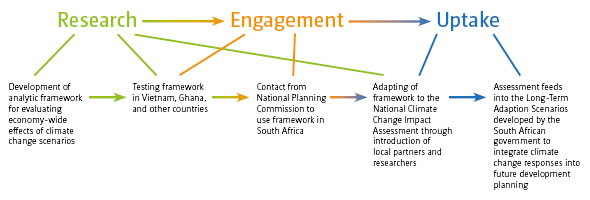Research Uptake
Climate modelling for improving development strategy – The case of South Africa
Through the Development Under Climate Change (DUCC) project UNU-WIDER supported efforts by the government of South Africa to develop an integrated approach to assess the effects of climate change on the national economy.
Climate analysis for economic policy-making
Strategic policy decisions that influence the pace and character of socioeconomic development will also affect the potential vulnerability of societies to climate change. Appropriate consideration of climate change needs to be integrated into long-run strategic decision-making both within government and in the private sector.
One of the difficulties in assisting decision makers addressing climate change is translating scientific and biophysical processes into potential economic outcomes. Understanding the impacts of climate change and its links to development policy therefore requires a range of methodologies and a multidisciplinary team.
UNU-WIDER, in collaboration with external partners, has developed a comprehensive framework for the analysis of the implications of climate change for national economies. The framework traces climate projections through various impact channels—such as agricultural yields, production of hydropower, water supply and demand balance, and costs of maintaining infrastructure. In a final step, all impact channels are integrated into a detailed economy-wide model.
Importantly, such an approach allows the various impact channels to reinforce or offset one another. This analysis can then be used in the formulation of strategies for development that include specific adaptation policies designed to counter future climatic changes.
The case of South Africa
The DUCC framework had already been tested in several low-income countries when the Long Term Adaptation Scenarios (LTAS) group approached UNU-WIDER with a request to adapt the framework to South Africa using national research capacity in order to help design and implement a National Climate Change Impact Assessment focusing on agriculture, water, and infrastructure.
This assessment formed an integral part of the LTAS framework developed by the South African government and partners in order to begin integrating climate change adaptation activities across different economic sectors to overcome the challenges it might present to the country’s development aspirations. The work undertaken under LTAS represents the first attempt at an integrated approach to assessing the potential impacts of climate change on the national economy of South Africa looking out to 2050.
To design and implement the research behind the assessment, UNU-WIDER has been part of a large collaborative effort, which included the Planning Commission, the National Treasury, the Department of Environmental Affairs, the South African National Biodiversity Institute, and South African researchers.
The effect of climate change on the South African economy by 2050
The results from studies undertaken by UNU-WIDER and its partners found a wide range of potential impacts of climate change and emphasized the importance of spatial and temporal variation in these impacts. In particular, the study highlighted the potential impacts of climate change on the water supply sector, road infrastructure, and dry-land agriculture. These factors combine to reduce overall GDP growth, with impacts gradually increasing through time. In addition, the analysis raises concerns about the potential for strong impacts in specific regions and economic sectors.
Uptake
The results of the project have been used to inform discussions around potential alternative development and adaptation scenarios in South Africa as part of the LTAS programme, and ultimately contributed to the third national communication on climate change to the Intergovernmental Panel on Climate Change (IPCC) (Figure 1). The report was distributed for public comments in May 2014 and was revised in June 2014.

The analysis received international recognition when it was selected as a ‘project to watch’ by the United Nations in its ‘Big Data Climate Challenge’, part of the build up to the UN Secretary-General’s Climate Summit on 23 September 2014 at UN Headquarters, New York.
| Key Lessons |
|---|
|
The degree of success in these collaborative endeavours surpassed even the most optimistic plans. The project has achieved a high level of engagement from local institutions and local researchers, including substantial commitments. Reasons for this success include:
|
 Join the network
Join the network